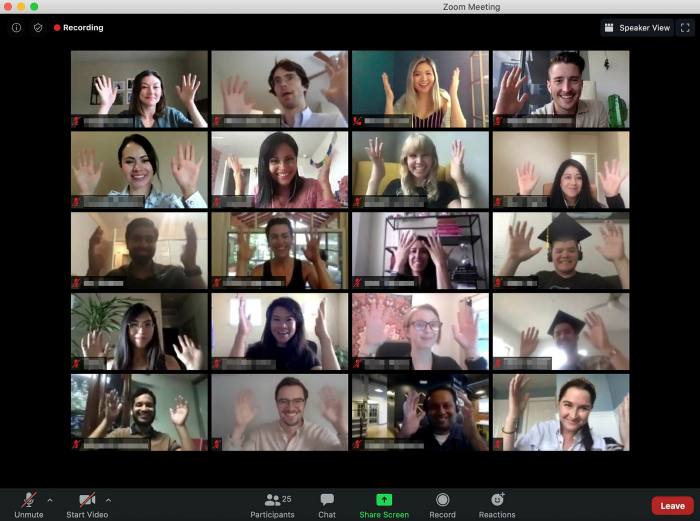As universities closed their lecture rooms and providers modified to the disruption of the coronavirus pandemic previous calendar year, PepsiCo’s chief understanding officer, Molly Nagler, had to scrap ideas to send out executives to programmes at Wharton School and Yale School of Management.
But relatively than dismiss executive education as impractical, unaffordable or unjustifiable all through a disaster, Nagler doubled down and negotiated on the web possibilities for the US-centered food stuff and beverages team.
“We are inclined to use the in-man or woman, campus-centered programme for executives to create a differentiated practical experience and expose them to chopping-edge pondering and research,” she suggests. “We’ll however use the campus for elite experiences but fewer than before simply because of the expense and the obstacle to get all people in a person place.”
Like many of her counterparts in providers all around the environment, Nagler is not chopping again on her education finances. As a substitute, she is reconsidering who should find out, what they should study and how finest to coach them — and reviewing her selection of external programmes.
Coronavirus imposed a sharp shock on business schools’ non-degree “open” classes for supervisors and bespoke “custom” offerings for corporate clientele. Though demand from customers for qualifications this sort of as the MBA has held up perfectly, the international university-centered executive education industry, well worth close to $2bn in 2019, fell by a 3rd in 2020.
François Ortalo-Magné, dean of London Business enterprise School, suggests its executive programmes generated £50m a calendar year before Covid-19, but that quantity has considering the fact that halved. “The pandemic has not been simple,” he suggests.
Michael Malefakis, head of executive programmes at Wharton, agrees it has been a extremely difficult time: “We’ve pushed ourselves and the industry has pushed us significantly from our previous ease and comfort zone. It is produced us rethink how we construction and provide education in a way that has not been as radical considering the fact that environment war two.”
The good information for education vendors is that hunger remains potent. Mark Roberts, associate dean of executive education at Insead, attracts a contrast with the 2008 economical disaster, when education programmes were being observed as “something you change off as an expense in a knee-jerk way”. He adds: “We haven’t observed that this time. Something basic has shifted strategically.”

Likewise, Nuno Gonçalves, chief understanding and development officer at Mars, has not observed his finances fall. “Every strategic paper I see talks about ‘people capabilities’, about what we require tomorrow,” he suggests. “If we want to be profitable, we require to have these capabilities.” Along with “hard skills” concentrated on electronic transformation and analytics, Gonçalves sees demand from customers for the “soft skills” that foster management qualities this sort of as empathy — and how to stability them with the continuing require for professional accomplishment.
Josh Bersin, a US corporate understanding marketing consultant, agrees that coronavirus has concentrated providers on “people issues” and absent from administration philosophies. “It’s about human-centred management which is additional caring,” he suggests. Tied to this is range and inclusion, topics that are “on employees’ minds, reporters’ minds, all those of rankings, with buyers deciding not to acquire merchandise from providers that are not being truthful. We have observed range has barely been addressed, and if just about anything we’ve been backsliding.”
Along with the acquisition of particular capabilities, education programmes deliver a split from the relentless pressures of working day-to-working day do the job in lockdown. “Companies are seeking for meaningful engagements for staff members that are not just about do the job or a Zoom celebration,” suggests Ortalo-Magné of London Business enterprise School. “We have provided time for contributors to chat with our school to bring them which means as perfectly as understanding.”
What do you imagine?
The FT would like to listen to from chief understanding officers about their sights on subject areas, budgets and approaches of understanding. Be sure to comprehensive our brief survey at ft.com/closurvey by March 5. The final results will sort part of our Govt Education report in Could.
Matt Confer, a vice-president at Abilitie, a business which provides education this sort of as business simulations, suggests many clientele are interested in education simply because it allows with workers retention and enthusiasm. “People have been at residence additional than any of us wanted or expected and we’re receiving burnt out,” he suggests.

Proven in 2015, Abilitie — which now provides a mini on the web MBA — claimed its finest two economical quarters in the 2nd fifty percent of previous calendar year.
Though deal with-to-deal with meetings can create a wealthy understanding practical experience not usually replicable on the web, electronic seminars, classes and situations make it much easier to attract the two high-profile external speakers, this sort of as occupied chief executives, and clientele who battle to take time off for comprehensive-time study. Technologies has also created fewer daunting implies for contributors who are shy to communicate out.
Digitisation raises a broader issue for corporate understanding officers about the “democratisation” of education. Though expensive on-campus programmes were being usually limited to a little team of senior executives, on the web understanding can supply a broader vary of education additional cheaply and proficiently to a significantly more substantial variety of workers at diverse ranges in an organisation.
FT survey: Are you a operating parent? How has the pandemic impacted you?

The pandemic has turned everyone’s lives upside down, but it has been particularly disruptive for many mother and father as they juggle do the job, housework and homeschooling. We want to know how it has been for you.
Be sure to fill out this sort. Your participation will be integral to our reporting.
Erin Clark, follow chief for management development and understanding at experienced providers business Deloitte, suggests: “It’s about management at all ranges — something that can no for a longer period be reserved for the decide on several. Investment in acquiring leaders was disproportionately anchored in hierarchy. Virtual understanding provides the chance to be widely available.”
The demand from customers for on the web education is intensifying the competition between business universities and option vendors of executive education — providers which may possibly have fewer educational heritage but which can be additional nimble. Deloitte, like other consultancies, recruiters and specialist companies, as perfectly as on the web educators from Abilitie to Coursera, are growing.
Andrew Crisp, co-founder of the education consultancy CarringtonCrisp, suggests the pandemic “is the stop of luxury understanding, with the board at a 5-star hotel for a weekend”. Business enterprise universities, he thinks, “are likely to have to sharpen up simply because the new entrants are additional fleet of foot in responding to customers”.
But Ravi Kumar, president of Infosys, sees a continuing require for engagement with universities, as they refocus on lifetime-lengthy understanding. “They will have to pivot,” he suggests. “Executive education was about refreshing what you had learnt. Now understanding is about switching from a person job or job to a different. Education and do the job will be intertwined.”
The deserves of the digital classroom

Just when Sumit Tomar was owing to commence an innovative finance system at Wharton School in March previous calendar year, the pandemic pushed his executive education entirely on the web.
But the electrical engineer, who lives in San Diego, has no regrets. “The digital classroom serves my requires properly,” he suggests. “With the time variance, I can study from 6.30am until 11am and then have ample time to do my working day job until 8pm. If I have some urgent do the job, I can walk out and occur again to view the lectures yet again in the night.”
Lots of business universities have endured setbacks to their innovative administration programmes, with applicants discouraged by the forced shift to electronic understanding. But Tomar was delighted to fork out the comprehensive $sixty seven,000 charge and stay away from the inconvenience and charges of journey. “It’s not cheap but it was surely well worth the income.”
Tomar is chief executive of pSemi, a semiconductor business. He suggests Wharton’s system, plus a preceding a person in normal administration at Stanford a ten years ago, were being a substitute for an MBA.
“I could never ever consider researching comprehensive time: that’s two decades, a large amount of income used and you are out of do the job. Though I’m operating, I’m understanding in parallel and applying lessons in the true environment.”
He admits that “the bonds you create in man or woman are not the very same point as a digital hold-out”, but that the electronic structure has produced it doable to attract high-quality contributors from all around the environment, as perfectly as main business figures willing to communicate to his lessons on the web.
He predicts the on the web structure will assistance fortify the position of main universities. “Even if the pandemic is in excess of, the digital classroom won’t go absent,” he suggests.





More Stories
Quality of Customer Service is Most Important
3 Reasons Why Indecisiveness Is Worse Than a Wrong Call
The Entrepreneurs Key to Success